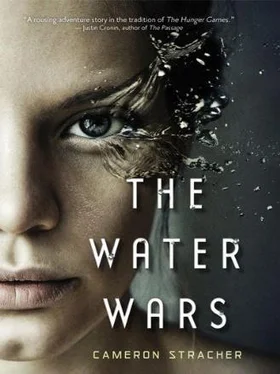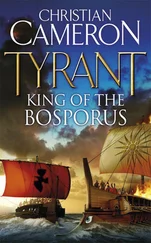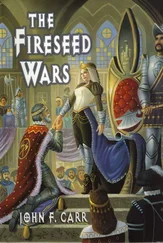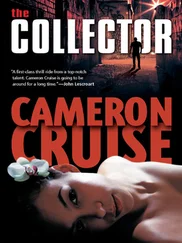A group of boys was crowded behind Will, cheering him on as he set a new high score on Death Racer. Nearby three girls tried to catch the boys’ attention. Over by Kai two men in identical blue shirts and black trousers played their own game of Geyser. They had a terrible time figuring out how to play, and their eyes wandered from the screen. It was a waste of credit, I thought; at least they could step aside and let someone else have a turn. But their low scores failed to dim their addiction to losing.
I made my way to Will. He stopped playing to chat with me. This earned me admiring stares from some of the boys and glares from the girls. Will asked if I wanted to race against him, but I knew better than to compete with him at his best event. Instead I suggested he race Kai.
The boys chose their cars. Kai picked a lime-green electric coupe, while Will chose a velvet-blue hydro racer. The cars were steered by two hand paddles; speed was controlled by a foot pedal. Another pedal shifted gears. The course Will selected was an arctic tundra populated by polar bears and baby seals—animals that had once lived where the ground was still frozen. The gun sounded, and Will flew over the landscape, his racer dodging snowdrifts and navigating sub-zero waterways. Kai slipped and skidded on the curvy road, crashing several times into icy mountainsides. Once he went straight through a colony of seals, losing thousands of points for each seal he hit.
But Will and Kai hooted loudly as if they were engaged in a neck-and-neck race instead of a blowout. Their excitement spread to the small crowd of teens who had gathered around them. The girls, who had figured out Will was my brother, wanted to know where we lived and what classes we took. The boys shouted advice to Kai, giving him tips on how to avoid the treacherous roads and packs of bears who tried to ambush him. I couldn’t stop smiling. It was more fun than we’d had in a long time. It didn’t matter that it was just a game—and not even a very good one. Playing together, being there with Kai and my brother and a group of kids I could imagine were friends, made me forget that our mother lay sick in her bed, dreadfully, inexplicably sick. The narcotic of the game worked its magic, and we were drawn inside.
The cars raced toward the finish line. Over and under, around and through. Will was unbeatable and unstoppable, and I was proud to be his sister.
Then I had an uncomfortable sensation, a prickling at the back of my neck, as if someone were watching me. From the corner of my eye, I saw the two men in the blue shirts staring at us, heads angled low, gazes slanted in our direction. They seemed unnaturally interested, with eyes for no one else in the room.
But when I turned, the men were gone, and I wondered whether I had seen them at all.
The next afternoon Kai wi-texted me to see if I wanted to go scavenging. In the short hills behind his apartment were the remains of an old mill. It had been abandoned in the Great Panic, before we were born. The factory was now a decaying agglomeration of empty buildings, busted silos, and broken-down trucks. Lizards and snakes coiled in the ruins. Our father had warned us never to go there—he claimed there were diseases and dangers—but Kai said it was safe.
It was Sunday, and Will was at water mission class. This summer he would have to spend a month bringing water to less fortunate towns. It didn’t matter that we barely had enough water ourselves; the government ordered public service, and there was little choice but to obey. Will said it was just an excuse to get free labor, but even he didn’t dare risk defiance. There were “education camps” where they took people who objected and taught them social responsibility. The “lessons” left them damaged and disfigured.
I rode my pedicycle to Kai’s complex and locked it outside the front gate. Kai was waiting at the end of the drive. He smiled with one side of his mouth when he saw me and gave a small wave with his hand. Whenever I saw him standing like that, face poised in careful expectation, my heart went out to him. There was something cautious, something held back, in his smile. Drillers trusted no one, and their children learned to be wary and shrewd.
Kai led me through the scraggly cactus-like plants that survived for months without water. He didn’t say much, so I kept all the questions to myself. The hills were gradual and gentle, but I soon tired of walking uphill. We stopped for a few minutes, and he gave me a sealed bottle of water that was sweet and still cold. We sat on the side of a concrete barrier overgrown with a grayish lichen that brushed off on our clothes. I drank, and then Kai drank. Our feet kicked up dust.
Before the Great Panic, the mill had produced cornmeal and flour that was shipped across the country. But once the Canadians had dammed the rivers and the lower states began fighting over the trickles that remained, there wasn’t enough water for any industry, let alone something as water-intensive as milling. The snow masses and ice packs were gone, victims of warmer temperatures and higher sea levels. The aquifers and surface lakes had dried up or had been polluted. Forests were denuded, wetlands drained. Fresh, drinkable water was in the hands of a very few whose grip grew tighter as the world grew drier.
In truth there hadn’t been enough water for years. Our father told us the story they wouldn’t tell in school. Rain fell, but it couldn’t replenish what was gone. Growing populations made shortages worse. Although the planet was mostly water, less than one-tenth of one percent was drinkable. Riots broke out in the cities. Countries divided into factionalized republics. Wars erupted along their borders. In the aftermath hundreds of millions had died—most from disease and malnutrition. The Great Panic punctuated what men already knew but still somehow refused to accept: the world had run out of water.
“Where do you think the workers went?” I asked. “After the mill shut down?”
Kai shook his head. “There was nowhere to go.”
“The planes never bombed it.”
“They didn’t need to.”
He held out his hand to help me up. We continued climbing until we reached the entrance to the old mill. We knew it was the entrance, because part of a broken sign still hung above the ground. Otherwise we would not have recognized it. Wooden and steel beams blocked our passage, and a tangled mass of circuitry dangled from the ceiling like webbing.
Kai said the factory had so much power that the workers never turned off the lights and used the venti-units all night long, even when the buildings were empty. I already knew this from school, but I let Kai lecture me. He said water ran through the pipes that didn’t need to be filtered or treated; it could be drunk right out of the tap. This wasn’t entirely true. There were giant treatment plants that purified water and added chemicals like chlorine to kill bacteria. I had seen the holos in the archive. Still, things were safer then, and no one got sick just from taking a shower.
Kai held my hand the entire time he talked. Neither of us said anything about it, but I could feel his heart beating in the pulse of his palm. I wondered if this made me his girlfriend. When the girls in school got boyfriends, they usually wore a locket or an old article of the boy’s clothing. Maybe, I thought, that’s what the water was. I held tight to the empty bottle.
We threaded our way through the beams and wires. At each step Kai cautioned me to avoid a hole, a nail, a plank. Finally we emerged into the center of the factory floor. The old milling machines hunkered like animals, all rusted gears and broken parts. They had run on diesel fuel, which was refined and processed from oil sucked up from deep within the ground. But oil was too precious now to burn in a machine. These days it was rationed and used only to power tanks, jets, and the cars of wealthy men like Kai’s father. It was hard to believe oil had ever been so plentiful that people could burn it whenever they chose. But so many of the old ways were wasteful, like letting water spray onto the streets for no other reason than to run around beneath it on a hot day.
Читать дальше












